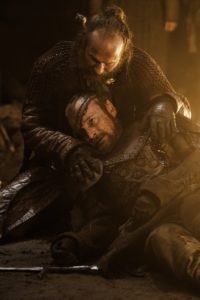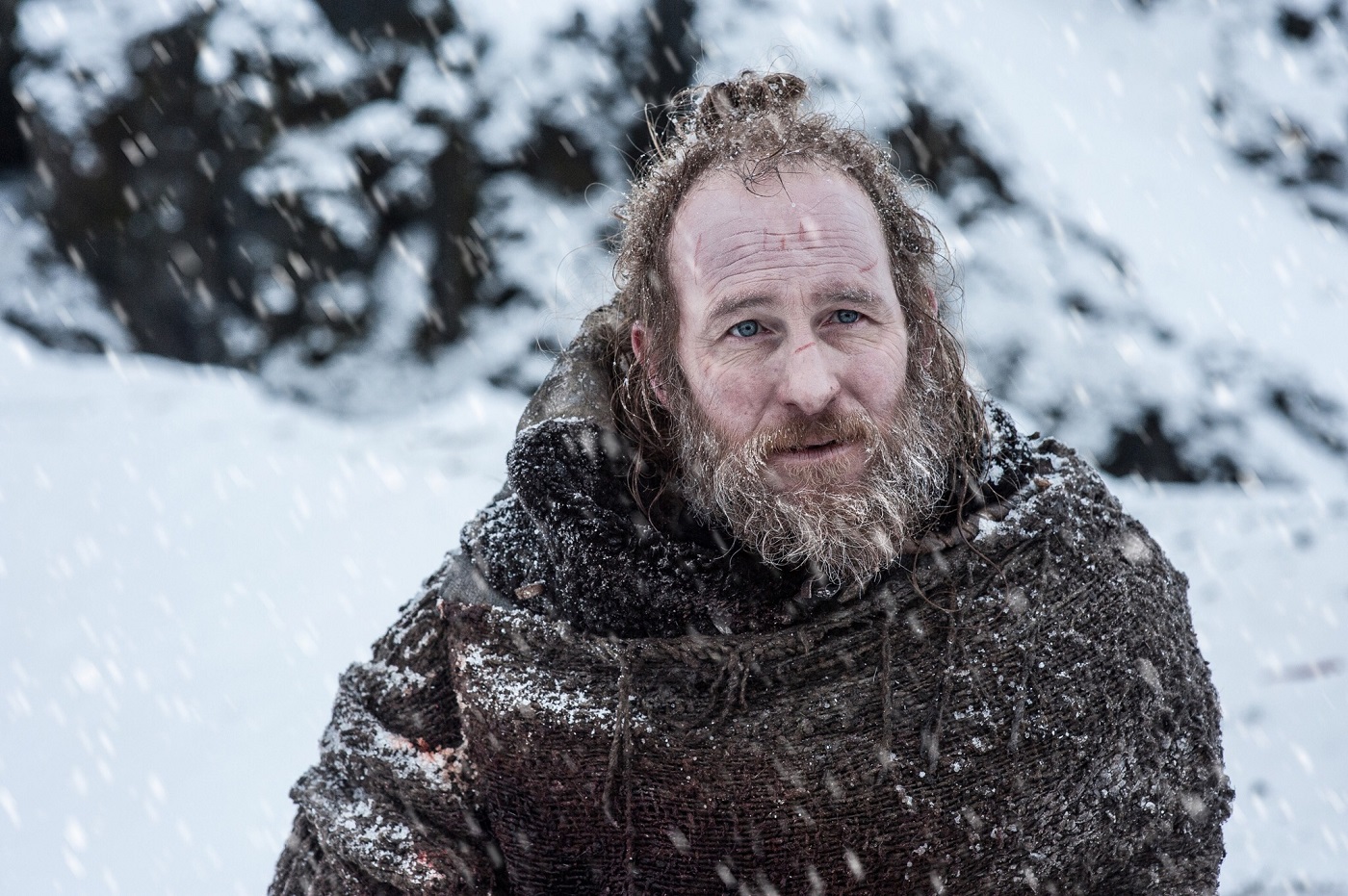Pour one (or several) out for a fallen friend — not all of the Magnificent Seven and their redshirt wildlings made it back from beyond in the Wall in the appropriately-named episode 6 of season 7, “Beyond The Wall.” Unfortunately, however, our favorite drunken Red Priest of R’hllor was among the casualties, so it’s time to say a fond farewell to Thoros of Myr and the actor who played him, Paul Kaye.
We first hear Thoros’ name mentioned in episode 4 of season 1, “Cripples, Bastards and Broken Things,” when Jory Cassel, the late captain of the Stark household guard, and Jaime Lannister are talking about the siege of Pyke some ten years earlier. “Do you remember Thoros of Myr charging through the breach?” Jaime asks. “With that flaming sword,” Jory replies. “I’ll remember that for the rest of my life.”
It was the first time but certainly not the last that we heard of Thoros’ famed charge through the breach, and it was telling that this Red Priest of R’hllor was known more for his fighting skills and his love of drink than for his piety — shortcomings that he never shied away from admitting with a smirk and a tip of his cup (or flask). It was that self-deprecating humor dashed with glimpses of surprising depth — humility, regret and gravity among them — that made Thoros such a likeable part of the Thrones cast, despite his role being confined largely to season 3.
British actor Paul Kaye was the perfect actor to sell Thoros’ particular brand. Kaye got his start in comedy, portraying crass TV personality Dennis Pennis on the BBC’s The Sunday Show, and he brought that to the wry Thoros from the first moment we see him, strolling through the forest singing “The Bear and the Maiden Fair” in episode 2 of season 3 just before discovering Arya, Gendry and Hot Pie and ribbing them about stealing castle-forged swords and calling them “dangerous persons.”
Although he initially appears to be merely the comic relief that the Brotherhood needs from the gravity of their mission, it’s not long before we discover that Thoros is much more. He may have been a faithless priest and a drunk in years past, but by the time we first meet him in Thrones, he’s a changed man — he still loves his rum, but he’s seen larger forces at work. His faith has been restored in a way he never could have imagined.
Kaye was masterful at dipping into and out of the gravity lent to Thoros by humility and the restoration of his faith. Viewers don’t yet know about Beric’s numerous resurrections by episode 4 of season 3, when Beric Dondarrion and the Hound are preparing for trial by combat, but what we see is a man of solemn conviction as Thoros delivers a prayer before the fight begins. It would have been easy for an actor to oversell such a scene, but what Kaye took pains to show us was that Thoros’ miracles didn’t make him a zealot; rather, it was as if his glimpses into something otherworldly had shown him the larger forces at work and placed a grim weight upon his shoulders.

“I’ve always been a terrible priest. Drank too much rum, fucked all the whores in King’s Landing…it’s a terrible thing to say, but by the time I came to Westeros I didn’t believe in our Lord. I decided that he, that all the gods, were stories that we tell the children to make them behave. So I wore the robes and every now and then I said the prayers, but it was just for show — a spectacle for the locals. Until the Mountain drove a lance through his heart. I knelt beside his cold body and said the old words, not because I believed in them, but because he was my friend and he was dead, and they were the only words I knew.“
In the hands of any other actor that scene could have been a maudlin performance, but in Kaye’s it was a moving one, a portrayal of a man who regrets his past but neither wallows in it nor ignores its lessons. As he talks he’s gazing into the distance, flask still in hand, and although his signature wry smile touches his lips, his eyes are far away, remembering.
After season 3, we don’t see Thoros again until episode 8 of season 6, when the Hound finds the Brotherhood preparing to hang the rogue members who slaughtered the villagers that the Hound was working beside to build a sept. Thoros’ face is more weathered and his hair is longer, but the wry humor that Kaye made a hallmark of the Red Priest is the first thing we notice, as he greets the Hound the same way Sandor once greeted him at the Inn at the Crossroads: “The fuck you doing here?” It was refreshing to see that although years of war and hardship had taken their toll on Thoros, he was still himself –- and all the credit goes to Kaye for showing us a man who was weary yet unbeaten.
We got a little more Thoros in season 7, beginning with episode 1 when we see the Brotherhood and the Hound riding north. Kaye again dips into Thoros’ solemnity when he’s gazing into the fire at the farmhouse, reading the flames, and hours later when he finds the Hound burying the corpses of the farmer and his daughter that once lived in the farmhouse at which the Brotherhood is staying the night — the people that Sandor robbed and left to starve when traveling with Arya in season 4. Thoros helps him, at first without saying a word, and doesn’t probe too deeply into whether or not the Hound knew them.
However, it was Thoros’ good humor in the face of odds decidedly against his favor that was his defining characteristic, and Kaye excelled in always delivering it with perfect timing and just the right amount of wit – even after he’s badly injured by the undead bear in “Beyond The Wall.” “Funny old life,” he mutters to Beric, before gesturing for his rum and taking a gulp to brace himself for Beric cauterizing his wounds with his flaming sword.
In “Beyond The Wall,” it’s the first time Jorah and Thoros have seen each other in years, and Jorah brought up the breach at Pyke — and although Thoros has been mortally wounded by the bear only hours earlier, when Jorah tells him that he thought he was the bravest man he had ever seen, Thoros smiles and replies, “Just the drunkest.”
It’s no accident that it was the story about Thoros charging through the breach at Pyke that bookended his time on Thrones. The first time, it was an awed retelling of his bravery; the second, it was more the truth of the matter. Somewhere in between was the real Thoros, who Kaye brought to life with a richness that made him more than just a minor character. He was a bright spot in the grim world of Westeros, and I hope he’s resting easy in the Night Lands.
The post Curtain Call: Paul Kaye appeared first on Watchers on the Wall.
Via http://watchersonthewall.com




No comments:
Post a Comment